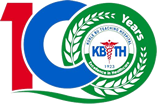 |
|
About usDietherapy Department plays a vital role in health promotion; it focuses on the prevention of diseases and promotion of health through healthy nutrition, and the nutritional management plans for individuals and groups with different types of diseases which ranges from special therapeutic diets to enteral and parenteral nutrition. Our StaffThe Dietherapy Department is made up of personnel with different disciplines or fields of expertise. They include: Dieticians Dieticians counseling their patients with special dietary needs Diet Cooks (a)Diet cooks reading meal requests from dieticians (b) Diet cook serving meals according to portion sizes Biostatistician Dietetic Interns Services RenderedThere are several services rendered by qualified and experienced dieticians in Korle Bu. Our services provided are patient-centred, evidence-based and it supports the multidisciplinary teamwork. The department provides a wide range of services for patients within all age groups, in-patient and outpatient settings. Our services include: Screening, assessment and reassessment: All in-patients who are nutritionally at risk are assessed by qualified clinical dieticians based on evaluation of various contributing factors to determine nutritional status, which includes medical and surgical history, diet history, anthropometric measurements, laboratory results, medications and cultural and personal preferences. Nutritional care plans and management are then placed accordingly. |
Dieticians taking (a) weight and (b) height measurements of a patient
Education and counseling: Education is the main role of the clinical dietician using different kinds of educational tools and materials to help the patient with better understanding and compliance with their diet. Individual and Group Counseling on nutritional practices designed to prevent diseases and promote health is also done by the dietician. Community outreach programmes and activities: In addition, the Dieticians work in the community to increase the public awareness of nutrition and its role in preventing diseases and promoting health, this includes teaching classes, workshops, keep fit clubs, organizations and the general public through media (TV, radio, newspapers, etc.). Monitoring progress: Dieticians monitor the progress of both in-patient and outpatients through follow-ups. As a result of the monitoring, dieticians are able to adjust the type or level of nutritional support, give amended dietary guidance or reinforce and set new goals for the patient. Inpatient Dietary Services: The department has a diet kitchen manned by diet cooks that caters for the feeding of inpatients. Our department plans and supervises the preparation of therapeutic foods such as liquid diets such as F-75 and F-100; semi-solid and family foods or other diets for individuals or group in the hospital. We plan nutritionally adequate diet for the in-patient as recommended by the consultant. We ensure that appropriate diet planning is done consistent with patient”s clinical requirement and diets are available on a regular basis. We provide guidelines to be able to serve inpatients” diet from the diet kitchen to in-patients bed table. We serve prompt and accurate meals to patients upon admission, and render diet counseling/nutrition promotion prior to discharge. We prepare a comprehensive diet chart which will help to maintain nutritional requirement for a patient according to the diagnosis. Outpatient service: Apart from the in-patient food service, the diet clinic of outpatient service helps in wider use of dietary counseling and serves to extend and clarify diet instructions and have follow-ups. Training/Internship programmes Future Perspective Growth: We are aiming to recruit qualified clinical dieticians in order to meet the hospital demand and to expand our outpatient services. Operational Efficiency: We strive for efficient and effective delivery of our services, through developing and practicing clear guidelines, processes and policies based on best practices and standard international guidelines e.g.; ADA, BDA, SADA, etc. Specialized nutrition services: We are aiming to have specialized clinical dieticians to meet the hospital needs e.g., liver transplant dietician, oncology dietician, ICU dietician, renal dietician, metabolic dietician, total parenteral nutrition dietician etc. Common conditions normally referred to the departmentThe dietician sees people with a variety of disease and conditions including: – Malnutrition e.g. undernutrition (i.e. Underweight, FTT, PEM) and overnutrition (i.e. overweight and obesity) Access to services provided by the Dietherapy DepartmentIn view of the fact that Dieticians work as part of the multidisciplinary team, a written and signed referral from a member of the consultant’s team or from any doctor is required before a Dietetic consultation can commence. Dietetic outpatients consultation starts from Monday to Friday at 8 a.m. to 4 p.m. The dietician occasionally may not be able to see you on the same day as scheduled as he may have another outpatient appointment elsewhere. If this is not possible an alternative outpatient appointment will be arranged for you to see the Dietician. There is also walk-in consultation for patients who are overweight or obese. |
